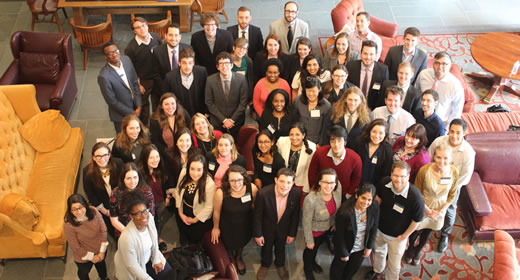
The 6th annual Ford+SPPG Conference took place earlier this month at Joan and Sanford Weill Hall in Ann Arbor. The event brings together MPP candidates from the Ford School and the University of Toronto’s School of Public Policy and Governance (SPPG) each winter for a two-day conference and policy case competition.
Through this student-led initiative, integrated American and Canadian teams were challenged to identify and communicate innovative solutions to issues facing both sides of the border. This year’s theme, “Building Resilient Cities: Addressing Crisis and Ongoing Stress,” posed two cases in which teams competed for a fictional $10 million resiliency grant through a national foundation. The foundation, represented by a panel of judges, was comprised of Ford School Professor Barry Rabe, SPPG Professor and Fellow Pamela Bryant, and Detroit Future City Fellow Chris Dorle (MPP ’07).
The first case involved the City of Rustburgh, loosely modeled after the Midwest cities of Detroit, London (Ontario), and Cleveland. Teams were faced with a community that had experienced decades of economic decline, precipitated by a number of factors including financial default on federal loans, the Savings and Loans Crisis, and changes in international free trade policies. Stakeholder groups for the first case included the Rustburgh Community Development Corporation, Rustburgh Education Connection, Rustburgh Chamber of Commerce, and the City of Rustburgh.
The winning team for this case was the City of Rustburgh, represented by Ford School students Katie Eddins (MPP ’16), Aliza Kazmi (MPP ’16), and Seema Singh (MPP ’15) and SPPG students Ellen Hines and Creig Lamb. In their feedback, the judges cited the team’s compelling use of a comparable case study from Cornell, recognition of limitations, and plans to leverage the city’s authority in a powerful way.
The second case involved the City of Coastowne, inspired by the west coast cities of Los Angeles, San Francisco, and Vancouver. Teams were faced with the an earthquake – “the big one” – in the six- to ten-month time horizon, with expected loss of life and property exceeding any previously recorded events. Stakeholder groups for the second case included the Coastowne Department of Public Works; Coastowne Environmental Coalition; Coastowne Digital, a coalition of tech firms; and Coast 2 Coast, a community group focused on diversity and bridging the urban/suburban divide.
The winning team for this was the Coastowne Department of Public Works, comprised of Ford School students Andrew Kraemer (MPP ’16) and Nick Pfost (MPP ’15) and SPPG students Andrew Blackburn, Rob Scherf, and Abiola Sulaiman. Judges, in their remarks, noted the feasibility and innovative nature of the team's solution to address critical needs and to develop balloon technology that could be deployed to supplement WiFi, data, and voice bandwidth during periods of sustained network stress during a crisis.
Keynote lectures for the weekend were delivered by Joseph Schilling, Director of Virginia Tech's Metropolitan Institute, and Douglas Kelbaugh, Professor of Architecture & Urban Planning at the Taubman College of Architecture and Urban Planning.
--By Nick Pfost (MPP '15)
Photos from the 6th annual Ford+SPPG Conference are available on Flickr. Additional content, including presentation slide decks, speaker bios, and a digital version of the conference booklet can be viewed and downloaded from the Ford+SPPG website.
More news from the Ford School